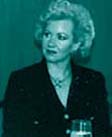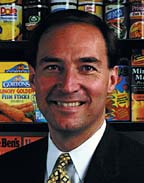
NFPA Supplier Audit Task Force members briefed industry representatives on the new program during NFPA's Annual Convention. Left to right: Scott Butler, Del Monte Foods; Eric Gibson, Kraft Foods; and Catherine Adams, H. J. Heinz.
“Guns or butter” is a phrase used to describe the governmental challenge of funding defense and domestic programs simultaneously. At times, food manufacturers may feel they face a similar decision, when deciding whether to fund quality assurance initiatives, or to let money fall straight to the bottom line. A new initiative by the National Food Processors Association (NFPA), Washington D.C., permits the objectives of both product quality and cost savings to be reached.
The purpose of the Supplier Audits for Food Excellence (SAFE) program is, as its name suggests, a plan to audit suppliers to food manufacturing and distributing companies. Designed with the help of more than two-dozen member companies of the NFPA, the program utilizes trained and certified third-party auditors who are guided by a comprehensive audit checklist. This method is accepted by an ever-increasing number of major food companies. “The promise of fewer audits is a major advantage,” states NFPA's Rich Salotto, who directs the new program. “The days of multiple, duplicative audits are numbered.”
Salotto says several audits already have been conducted and dozens more have been scheduled. “We hope to conduct upwards of 800 audits this year,” Salotto says. “Interest in the program is growing exponentially, and major retailers and foodservice companies are looking to incorporate the SAFE program in their own quality assurance programs.”
Some of the companies utilizing the program include HJ Heinz, Campbell's, Kraft, General Mills, Agrilink, Del Monte, and others. Many major retailers also have expressed interest. “Again, on the foodservice side, several major foodservice groups have voiced an interest in the NFPA-SAFE program,” Salotto informs. “Processors, foodservice and retail organizations all have found the SAFE Program to be a value-added tool for improving food safety and supply chain management.”
Accepted by Many
Julie Roth, vice president of operations, Bobs Candies, Albany, Georgia, a supplier to grocery chains, was the first company to sign up for the SAFE audit last year. “I am struck by the detail in the NFPA-SAFE audit,” she says. “The audit made us consider improvements to our quality systems that are very positive. But there's another advantage—aside from improving quality systems—and that is the prospect of fewer customer audits, which will save time and money. It is a marketing tool, as well. A successful NFPA-SAFE audit makes my company and products more attractive to customers that accept and, in some cases prefer, the SAFE audit.”In addition to using the program easily on the Internet, another unique feature is that its “scoring” system can be tailored to a company's specific needs and priorities. The audit checklist is designed to be the eyes and ears in the supplier's facility, and the executive summary allows a quick review of the quality systems. When combined with scoring, it is a powerful tool for vendor management. Joe Jimenez, president and chief executive officer, Heinz North America, reviewed the SAFE program and supports it. He says, “I believe the SAFE program has the potential to transform the industry. It will organize the food industry around one critical issue: food safety.”
Salotto reports more than 50 auditors have been trained and certified to perform the audit, with expectations of reaching 200 auditors by 2003. Training and maintaining top auditors is a key to maintaining quality. The audits completed so far have fully met expectations. “The program is working, and the number of audits now being scheduled is really beginning to ramp up. Everything you need to know to get started is on the web site,” Salotto continues.

NFPA's president and CEO, John Cady, says the audit is attractive to the entire U.S. food industry, and reveals interest in the program is growing internationally, especially in Mexico and Asia. “I soon see the day coming when participation in this program is going to be a prerequisite to new markets and customers. I am confident it's a question of when, not if.”
Kelly Johnston is executive vice president, Government Affairs and Communications, for the National Food Processors Association, and helped to launch the NFPA-SAFE program.